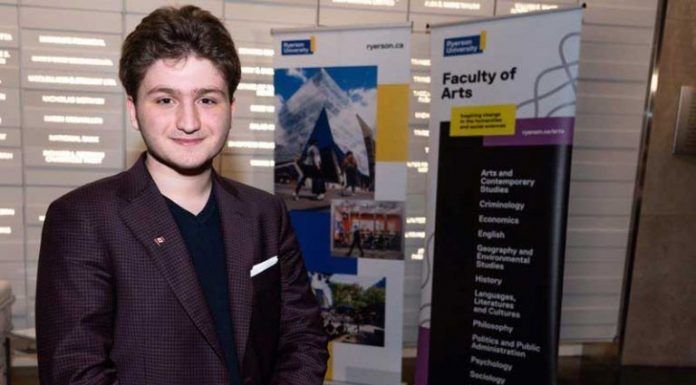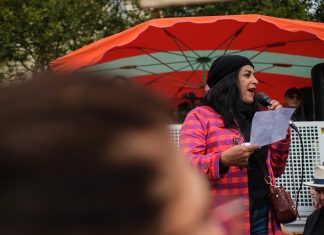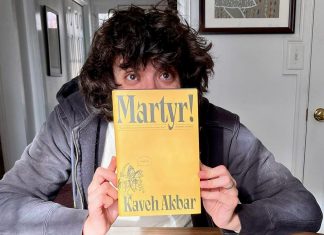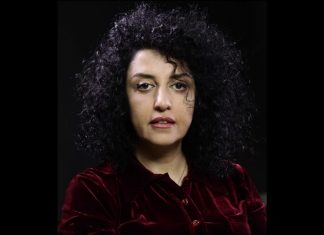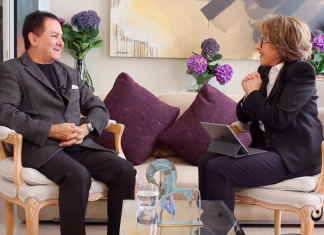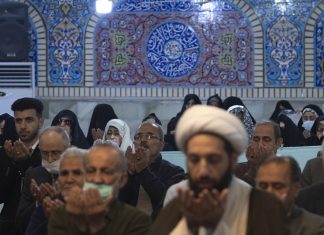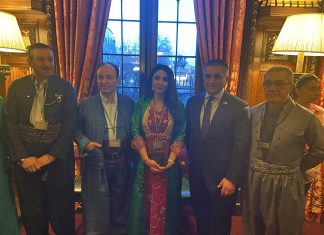By Firouzeh Nordstrom
Erfan Nouraee is a 20-year-old Iranian-Canadian second-year student in electronic engineering at York University’s Lassonde School of Engineering in Toronto who recently won a major international award for a sensor he invented.
Nouraee was born in Tehran in September 2001 and emigrated to Canada in 2020. He represented Canada at The International Competition for Inventors and Innovators held in September 2021 by the International Federation of Inventors’ Association (IFIA), based in Geneva. A panel of 35 judges from 30 countries reviewed some 1,000 entries from 35 countries.
The International Federation of Inventors Associations is “a nonprofit organization aiming to disseminate the culture of invention and innovation and establish cooperation with the related organizations.”
The judges awarded Erfan Nouraee the Bronze Medal for his invention, a fiber optic communication sensor that can detect light particles. It solves a significant problem in the fiber optic industry.
“I was around eight years old when I started making objects I had envisioned, using paper, glue, trash and discarded houseware appliances,” Erfan Nouraee told Kayhan Life in a recent interview. “Seeing my interest in physics and electronics, my parents bought me electronic modules as birthday gifts and when I got good grades in school, they always encouraged me to enter in science competitions.”
“My interest was principally in aeronautics and space research by NASA [the National Aeronautics and Space Administration]. I designed and made models of fuel rockets and space shuttles,” Nouraee said. “I also read books that were difficult to understand and was fascinated by Einstein’s general theory of relativity and still am. Natural laws and scientific models interested me.”
When he was 16 years old, Nouraee won the top prize at the Khwarazmi International Award in Tehran with his invention “quantum analyzer sensor based on the photoelectron’s radiation detection.” The instrument can quantify the “liberated photoelectrons” of metal and measure and show the properties of electromagnetic radiation of particle acceleration.
When he was in the ninth grade, Nouraee was a robotics team member that won the top prize at the Federation of International Robot-soccer Association (FIRA) Roboworld Cup and Congress. Erfan Nouraee and the winning team were invited to compete in the 23rd FIRA Cup in Taiwan in 2018, but he could not get a visa to travel to Taiwan.
“We had a problem getting a visa because Taiwan did not have an embassy in Iran,” Nouraee noted. “Authorities were no help either. They did not understand that we needed visas to travel to Taiwan. Our families had to pay for our trip. There were seven people in the team, but three pulled out because of the high cost of traveling and the exchange rate for the dollar. We did everything ourselves, including getting parts we needed, but ultimately achieved third place in the competition.”
After winning the International Federation of Inventors Associations competition in September 2021, Nouraee received congratulatory messages from several senior Canadian government officials, including Mayor of Toronto John Tory; Premier of Ontario Doug Ford; a member of Canada’s House of Commons representing Willowdale; Ali Ehsassi, Canada’s Minister of International Trade; Mary Ng; and the Canadian Embassy in Washington, DC.
[aesop_image img=”https://kayhanlife.com/wp-content/uploads/2022/03/erfan-nooraee_1-768×576-1.jpg” panorama=”off” credit=”KL./” align=”center” lightbox=”on” captionsrc=”custom” captionposition=”left” revealfx=”off” overlay_revealfx=”off”]
Several foreign governments, including Portugal and Australia, posted congratulatory messages to Nouraee on their official Facebook and Twitter pages.
Along with his scientific pursuits, Nouraee is also active in the Liberal Party of Canada, headed by Prime Minister Justin Trudeau. In September 2021, the Duke of Edinburgh’s International Award gave Nouraee the prestigious Bronze Standard for his volunteer work as a member of the youth advisory committee to Minister Mary Ng.
[aesop_image img=”https://kayhanlife.com/wp-content/uploads/2022/03/erfan-nooraee_3.jpg” panorama=”off” credit=”KL./” align=”center” lightbox=”on” captionsrc=”custom” captionposition=”left” revealfx=”off” overlay_revealfx=”off”]
[aesop_image img=”https://kayhanlife.com/wp-content/uploads/2022/03/erfan-nooraee.jpg” panorama=”off” credit=”KL./” align=”center” lightbox=”on” captionsrc=”custom” captionposition=”left” revealfx=”off” overlay_revealfx=”off”]
The Duke of Edinburgh’s International Award is a “non-formal education and learning framework operating in some 130 countries and territories around the world, through which young people’s achievements outside of academia are recognized and celebrated.”
Nouraee was 18 years old when he came up with his second invention, a fiber-optic connection sensor that detected light particles. It solved a significant problem in the fiber optic industry. Nouraee registered his design with the U.S. Patent and Trademark Office (USPTO).
“Fiber optic cables are a significant part of the social network channels, transferring internet, phone, and television signals,” Nouraee explained. “However, they degrade through time and become weaker and unreliable. For instance, the cables used on the industrial scale lose their quality and strength.”
“The sensors I have designed use photon-based processing units that reduce noise generated by light waves. It restores the quality of the light waves through the communication channels,” Nouraee said. “The sensors also prolong the life of the fiber optic cables, reduce the byproducts of fiber optics that are harmful to the environment, and lower the repair cost. It has massive potential for the industries.”
“We can use this machine to send digital signals through a fiber optic communication channel, using light waves. It helps to maintain the quality and strength of a signal,” Nouraee explained. “It will improve the quality and speed of a signal.”
After finishing high school, Nouraee received his certificate from The International English Language Testing System (IELTS) — an international standardized English language proficiency test for non-native English language speakers — and moved to Canada.
“I wanted to go somewhere that supported and respected my ideas and helped me with my startup by giving me the resources I needed,” Nouraee explained. “I discussed it with my family. My mother supported me, and subsequently, I applied to York University’s Lassonde School of Engineering. Sometime later, I got my visa from the [Canadian] embassy.”
“After arriving in Canada, I registered my design with the World Intellectual Property Organization (WIPO),” Nouraee said. “The university gave me all the resources and a laboratory I needed. After registering my design with the WIPO, I became a member of the International Federation of Inventors’ Associations (IFIA).”
“I was a hardworking student with several innovative ideas and had two inventions registered in my name. I also won a top award among thousands of inventions entered in a prestigious national competition in Iran, but no one saw my robots,” Nouraee explained. “I did not receive financial support. In stark contrast, I am receiving much backing now, and I am grateful for the Canadian system for its support.”
“There are inherent problems within Iran’s education and research systems,” Nouraee explained. “Researchers are the driving force behind a society’s progress and, therefore, they must be protected. Unfortunately, such support does not exist in Iran. That was one of the principal reasons I emigrated so that I can have access to more resources and better research facilities.”
“I worry about young people in Iran like myself,” Nouraee said. “I am in contact with many of them. They have interesting and exciting ideas but receive no support. Many of them try to move to Canada or the U.S.”
“I like the type of politics that support scientific and industrial innovations,” Nouraee said in conclusion. “I hope to be like those Canadian politicians who voice the concerns of young people involved in research and innovation who do not receive support like when I was in Iran.”

